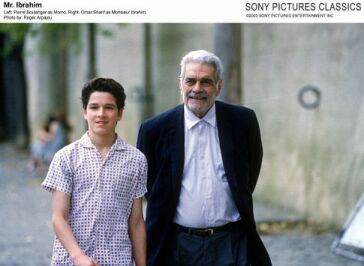Monsieur Ibrahim (Monsieur Ibrahim et les fleurs du Coran)
(Reviewed February 13, 2004)
|
| Rating: |

|
|
|
Order this DVD or VHS Tape through Amazon.com
|
Monsieur Ibrahim by FranÁois Dupeyron offers a wonderfully meaty role to Omar Sharif ó enough, it seems, to have lured him out of retirement ó but not a lot to the movie-goer apart from the pleasure of seeing a fine actor at work.. Or rather two fine actors. For he is well-matched with his partner in this two-hander, the newcomer Pierre Boulanger. Young Mr Boulanger plays Momo a Jewish boy of 16 in a down-at-heels Paris neighborhood, circa 1963, whose mother has abandoned him and whose father (Gilbert Melki) suffers from depression. Sharif as the eponymous Ibrahim, a small shopkeeper from the neighborhood, befriends him and eventually becomes a surrogate father to him.
Their acquaintance begins with Momoís shoplifting. As he approaches the counter with the goods he means to pay for and the ones secreted in his pockets, he tells himself: "I donít care. Heís an Arab." Instead of accusing him of theft, Ibrahim says mildly, as if he had overheard his thought: "Iím not an Arab. Iím from the Golden Crescent" ó by which he means Turkey. This immediately marks the old man out as a sage and a wise man, perhaps some kind of shaman, to whom Momo subsequently turns in all the troubles of his teenage life, which his father is unable or unwilling to help him with.
These include doing the shopping and cooking for his father ó Ibrahim tells him to buy cat-food and pass it off as "farmhouse patť" and, sure enough, his father never notices the difference ó his longing for his absent mother, jealousy of his absent brother Paulie, with whom his father is always comparing him unfavorably, and, of course, girls.The scenes in which Momo attacks his piggybank in order to raise enough money to hire one of the several prostitutes who patrol his working-class neighborhood are among the freshest and most charming of the film, though the breaking of his heart over a neighbor girl of his own age called Myriam (Lola Naynmark) is rather rushed over.
This is because, I take it, the focus is always on Ibrahimís gentle friendship and wise words of counsel. For example, Ibrahim tells Momo to smile more. When Momo tells him that he canít afford to smile, Ibrahim replies that you donít need to be happy to smile: "Smiling is what makes you happy." Likewise, when the neighbor minx throws him over, Ibrahim consoles Momo by telling him that his love is still his, only Myriam has lost it. "What you give is yours to keep; what you keep is lost forever."
Sound familiar? Yep, itís not for nothing that this puppy is set in the Ď60s. The despised "Arab" (Momoís father tells him that "Arab" means anyone whose shop is open from 8 A.M. until midnight and on Sundays) turns out to be a proto-hippie who introduces the boy to Sufism, even whisking him off to Turkey for an encounter with some whirling dervishes. Ibrahimís favorite catch-phrase is: "I only know whatís in my Koran." As this seems to be meant to signify his simplicity and spirituality, it seems curious, to say the least, that the movie itself doesnít show the slightest interest in what is in his Koran. Only in his saying that heís interested in it.
Or rather, perhaps, it imagines that whatís in the Koran is the same as whatís in the bumper-sticker sentiment of Timmy Thomasís song, "Why canít we live together?" which comes up over the closing credits. At any rate, the assumption seems to be that the Koran, like the Bible in hippie mythology, is reducible to such a feel-good formula. Even the dervishes and the gentle Sufis might find that insulting. 
[Top][Back]
|



